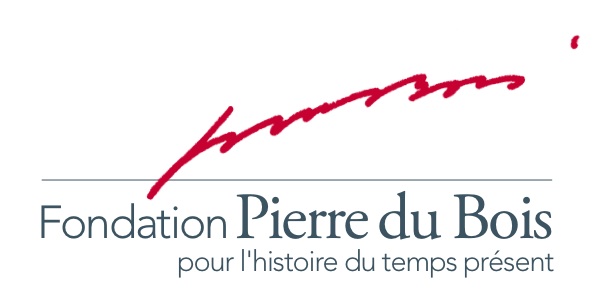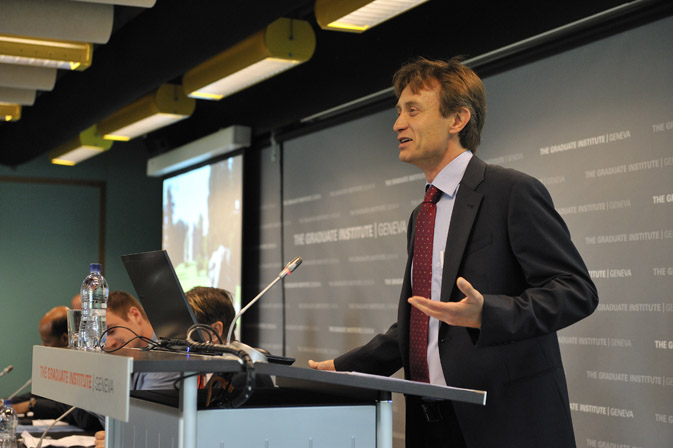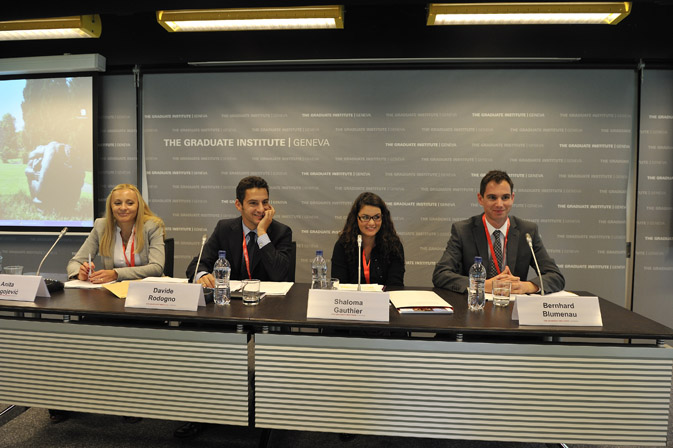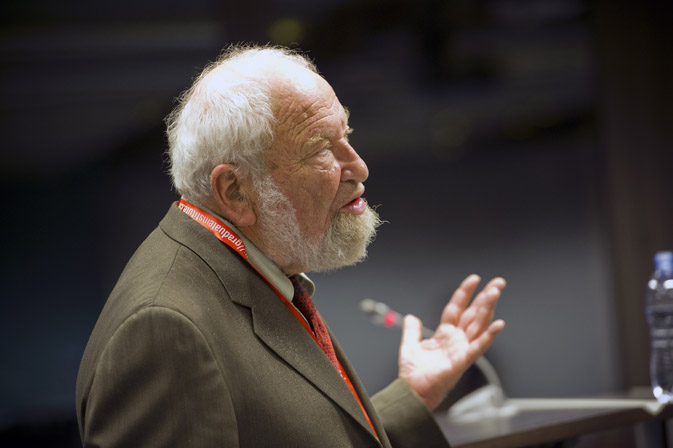Terrorism and International Politics: Past, Present, and Future
29 – 30 September 2011
nn
This year’s conference on “Terrorism and International Politics: Past, Present and Future” was the third one in a series organised by the Graduate Institute of International and Development Studies and the Fondation Pierre du Bois pour l’histoire du temps present. The conference assembled an interesting group of young scholars and more seasoned academics. It assesses the phenomenon of terrorism from a historical perspective. The conference was also financially supported by a grant from the Swiss National Science Foundation.
Taking the tenth anniversary of the attacks of 9/11 as a point of departure, the conference participants first looked at state responses to terrorism prior to and during WWII. Richard Bach Jensen examined the anarchist wave of terrorism of the fin du siècle and analysed states reactions to it. Florian Grafl then studied the communities of violence in interwar Barcelona and concluded that these communities of counter-terrorist violence were not successful and hence not an example that should be repeated by other countries with similar problems. Pierre-Etienne Bourneuf concluded the panel by looking at state terrorism, which was exercised during the allied bomber campaigns against Germany in WWII.
The next panel focussed on terrorism during the cold war. Jonathan Gantt looked at terrorism in early cold-war America, while Thomas Riegler assessed state-sponsored terrorism in the 1970s and 1980s, especially in Austria. Richard Thornton contributed a paper on the hijacking of TWA flight 847 in 1985 and how the Reagan administration’s response.
The third panel looked at how international organisations dealt with terrorism. Bernhard Blumenau provided an overview of West Germany’s diplomatic efforts at the United Nations concerning measures against terrorism. Shaloma Gauthier followed up on this by looking at National Liberation Movements, in particular SWAPO, and how the UN dealt with the ambiguous problems linked to fighting terrorism, while at the same time honouring the principles of self-determination. Anita Blagojevic concluded the panel by an analysis of Council of Europe and the European Union’s reaction to terrorism after 9/11 and how those were in conflict with human rights.
The next panel focussed on selected countries’ experiences with terrorism. Markus Lammert explained the reasons for the relative absence of terrorist violence in France in the early half of the 1970s while Nathaniel Powell looked at a case study of France’s encounter with terrorist violence abroad, in the form of a hostage crisis in Chad in 1974. Tobias Hof then turned toward the Italian state’s reactions to terrorism in the 1970s and 1980s and in particular the repentance policy.
The day was concluded by a keynote address by well-known scholar David C. Rapoport who elaborated on his notion of the “waves” of terrorism. He assessed the international context of the four waves of modern terror: 1) the anarchist wave 2) movements of national liberation 3) leftist social revolutionary terrorism and the 4) religious wave. He made some final remarks on a possible fifth wave that could be emerging.
The second day of the conference started with a panel on regional experiences in Bengal, Libya and the United States. Rashed uz Zaman gave an overview on 100 years of Bengal terrorism. He was followed by Mattia Toaldo who addressed Ronald Reagan’s reactions to terrorism sponsored by Libya in the 1980s. Jérôme Gygax discussed the US’ public diplomacy regarding terrorism.
The sixth panel addressed Al Qaeda, ten years after the 9/11 attacks. Geoffrey Porter focussed on Al Qaeda’s operations in the Maghreb area while Mohammad-Mahmoud Ould Mohamedou looked at the broader picture of Al Qaeda and its current state.
The final panel proposed possible developments of terrorism and counter-terrorism. Sean Kalic examined whether terrorism in the 21st century would initiate a new era of warfare. Douglas Burgess then turned towards legal reactions to terrorism. He suggested that a regime be set up that would out rule acts of terrorism along the lines of pre-existing anti-pirate laws, making terrorist hostis humani generis.
For more information, please see the programme and photo gallery.
The conference resulted in following publication.
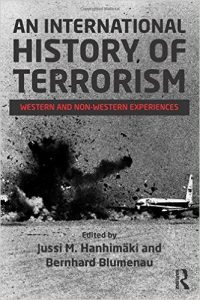 An International History of Terrorism: Western and non-Western Experiences
An International History of Terrorism: Western and non-Western Experiences
Edited by Jussi M. Hanhimäki and Bernhard Blumenau
London: Routledge, 2013.

